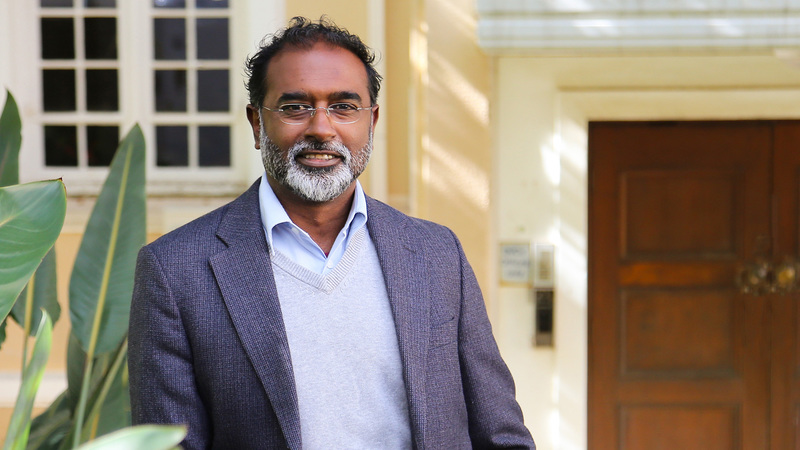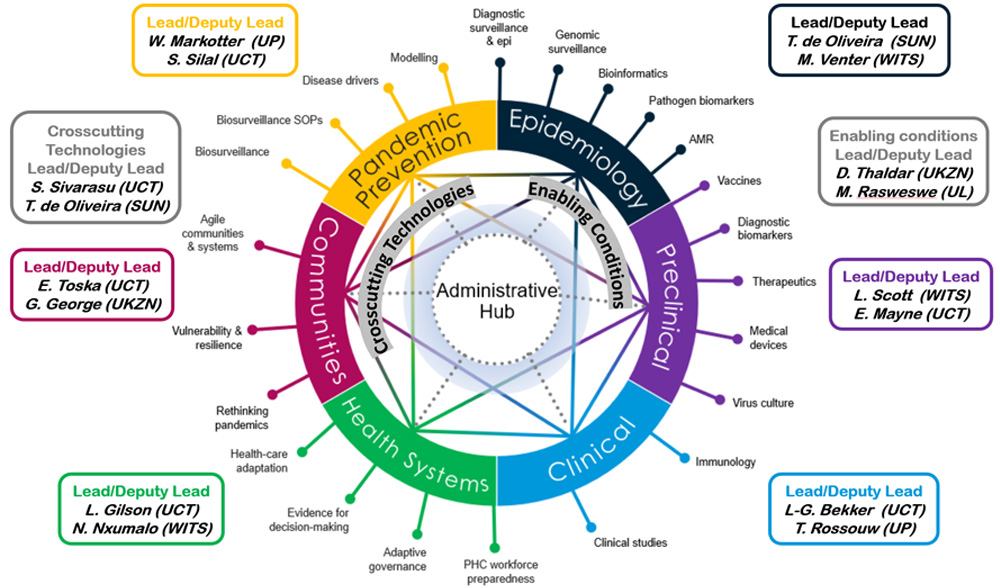UCT to co-lead institute for the pandemic preparedness
28 October 2025 | Professor Jeff Murugan
Dear colleagues and students
In 2024, the Department of Science, Technology and Innovation (DSTI), in partnership with the National Research Foundation (NRF), approved the establishment of the DSTI-NRF Institute for the Preparedness and Prevention of Pandemics (IP3).
Conceived in the wake of COVID-19, the IP3 is a multi-institutional and interdisciplinary research institute that will take a holistic approach to anticipating, responding to and recovering from future pandemics. Its mission is to ensure that our country and region are not only reactive to crises but actively build resilience through research, innovation, collaboration, capacity development and real-time responsiveness to pandemic threats.
Through an initial three-year funding award from the DSTI-NRF, the IP3 brings together 10 South African universities, who will work in partnership with government, civil society and industry to deliver its goals. Co-leading with the University of Cape Town (UCT) are:
- Sefako Makgatho Health Sciences University
- Stellenbosch University
- University of Fort Hare
- University of KwaZulu-Natal
- University of Limpopo
- University of Pretoria
- University of Venda
- University of the Western Cape
- University of the Witwatersrand
Through six thematic centres, each driven by a multi-organisational, intersectoral team of experts, the IP3 will conduct collaborative research to:
- improve surveillance of animals and the environment to predict and prevent zoonotic spillovers,
- detect and characterise emerging and re-emerging pathogens in human populations,
- develop and improve access to effective diagnostics, treatments and vaccines,
- strengthen laboratory and clinical trial capacity,
- create robust and adaptable health systems and
- address the social and economic factors that shape pandemic outcomes.
Two integrated platforms will work across and buttress the thematic centres to ensure that researchers have access to the required tools and technologies needed while also strengthening systems and frameworks such as ethics, data governance and regulatory processes that enable research to be translated into equitable and sustainable impact.

IP3 structure, activities and leads/deputy leads
UCT is currently serving as the Interim Administrative Hub (IAH) of the IP3, with Professor Mary-Ann Davies as the interim director. Professor Davies is a public health medicine specialist jointly appointed to UCT and the Western Cape Department of Health and Wellness; and played a key role in the provincial response to COVID-19. The IAH has begun operations to establish the institute’s governance structures, leadership and research activities. UCT is providing the institutional and administrative backbone that will enable the IP3 to coordinate its work nationally and eventually, regionally.
The IAH is being managed through dedicated professional and administrative support staff, whose expertise is ensuring that the institute can move from concept to reality. This team includes the project director (Dr Rein Weber) and administrator (Ms Drew West) as well as representatives from Central Research Finance, the Research Office and the Faculty of Health Sciences’ Research Office. They will work with the thematic centre and integrated platform leads to champion the administrative implementation of their scientific agendas.
Anticipated impact
With the initial grant, the IP3 has entered its set-up phase: establishing the Interim Administrative Hub at UCT, putting governance and leadership structures in place, and initiating the first research activities across the six thematic centres and two integrated platforms.
With longer-term funding, the IP3 will move from establishment to impact. The anticipated outcomes include:
- A national One Health biosurveillance system that can detect and prevent spillovers before they reach human populations.
- Diagnostic surveillance systems, genomic data platforms and epidemiological dashboards to allow real-time assessment of pandemic threats and enable swift public health action.
- Rapid development pipelines for vaccines, diagnostics and therapeutics generated locally rather than relying on global supply chains.
- Expanded clinical trial and laboratory capacity across the country and, eventually, the region.
- Stronger, more resilient health systems able to respond quickly to threats while maintaining essential services.
- Community-driven strategies to build trust and address social vulnerabilities that worsen pandemic outcomes.
- Cross-cutting technology platforms and enabling conditions that strengthen ethics, data governance and regulatory frameworks to sustain innovation and rapid response.
- Capacity development programmes to build a pipeline of pandemic-ready researchers.
This collaborative approach to problem-solving through our partner universities enables the development of multi-pronged solutions to future-proof our nation and region against arising pandemics. We are proud to be part of this initiative, which promises cooperative and translational research in the service of the community at large.
Sincerely
Professor Jeff Murugan
Acting Deputy Vice-Chancellor: Research and Internationalisation
Read previous communications:
 This work is licensed under a Creative Commons Attribution-NoDerivatives 4.0 International License.
This work is licensed under a Creative Commons Attribution-NoDerivatives 4.0 International License.
Please view the republishing articles page for more information.








